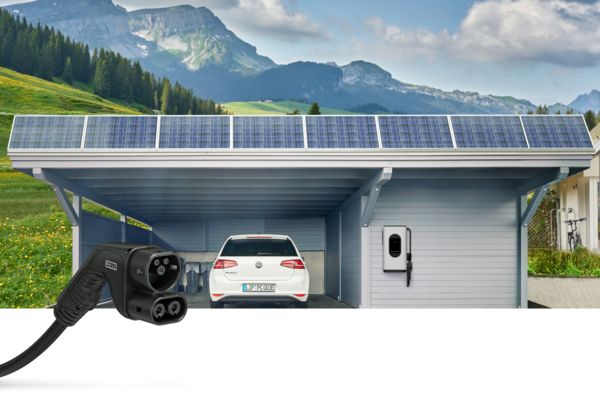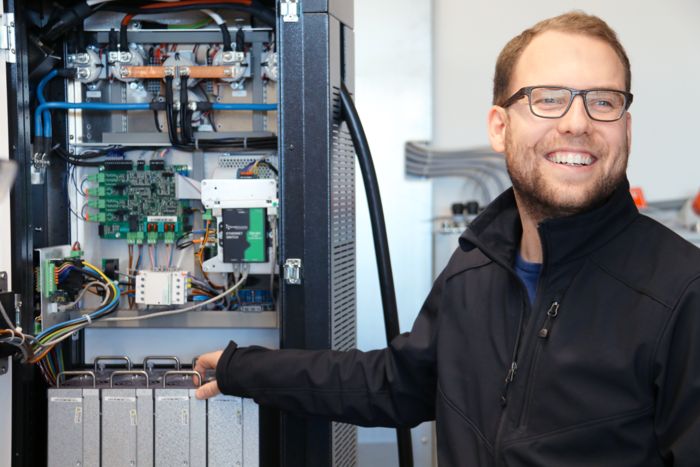Bidirectional charging With the help of the compact CCS charging cables from Phoenix Contact, Evtec has developed a home charger that not only charges electric cars but also serves as an additional energy storage system.

Overview
- The Swiss company Evtec is a specialist in DC fast charging. Evtec develops and produces turnkey charging solutions for e-mobility.
- The start-up has developed a home charger that enables bidirectional DC charging at work or at home.
- The CHARX connect compact CCS charging cables from Phoenix Contact used by Evtec were developed specifically for DC charging stations in the lower power range.
- Focusing on a lower power range allows for significantly more compact dimensions.

Dominik Mock is Director of Sales at Evtec AG
Customer profile
Evtec, based in Kriens, Switzerland, collaborates with global partners to develop and manufactures charging solutions for e-mobility. The company has focused on contract solutions for DC fast charging since 2010. The company’s experience in this field extends back to the early days of e-mobility in the late 1980s. Evtec counts on products from Phoenix Contact to build its efficient and scalable charging technology.
During a tour of the production facility in Kriens, Dominik Mock explains: “Behind each of our developments is a specific order. We can respond very individually to customer requirements, such as to camera systems for license plate recognition, but we can also develop the infrastructure between the station and the backend system, install billing systems, and, of course, also integrate ‘coffee machines.’ For us, the subject of charging is a big playing field. And bidirectional charging is one of the most exciting topics out there.”

The principle of bidirectionality for home use: Car batteries buffer the fluctuating yields when the sun shines - and feed back into the grid when darkness falls.
Application
The principle of bidirectionality enables in-car storage to buffer fluctuating renewable energy yields. “Bidirectional charging is no longer a problem in terms of technology. But in many cases, the framework conditions are still unclear, standards and norms, for example,” says Dominik Mock.
Evtec AG has developed a home charger with the name sospeso&charge that enables bidirectional charging for home use. The name is inspired by the caffè sospeso, a unique custom from the Naples area of paying for an extra coffee in addition to one’s own. The barista writes this down and then serves it to someone in need later upon request. This practice of social solidarity and the tradition of giving and taking applies to the same extent to bidirectional charging.
“Phoenix Contact has developed exactly the right technology to make DC charging appealing in this area. Slim and thus lightweight cables that are extremely resilient, durable and yet that do not require complex, and therefore expensive, cooling in this load range,” explains Dominik Mock.

The lightweight CHARX connect compact CCS charging connector features a compact design and excellent ergonomics.
The solution
We distinguish between two types of bidirectional charging: vehicle-to-home and vehicle-to-grid. Vehicle-to-home (V2H) refers to use that is typically focused on the end user’s home.
The Phoenix Contact CHARX connect compact charging connectors used by Evtec were developed specifically for home charging stations. Focusing on a lower power range allows for significantly more compact dimensions. Silver-plated contacts, an internal sealing concept, and highly accurate temperature sensors are safety features that make it safer and easier to handle high currents, both with the European CCS type 2 standard and the primarily American CCS type 1 standard. If the sospeso&charge home charger is connected to the household grid, not only does your own vehicle charge, but it can also serve as additional energy storage.
Vehicle-to-grid (V2G) can increase the share of renewable energies in the energy mix. Millions of electric cars serve as buffer storage units, thus becoming an important component of the energy revolution.
Summary
With its sospeso&charge home charger, the start-up enables bidirectional DC charging at work or at home. With the CHARX connect compact CCS charging cables, Phoenix Contact has the perfect products in its portfolio to make bidirectional charging also appealing for home use.

